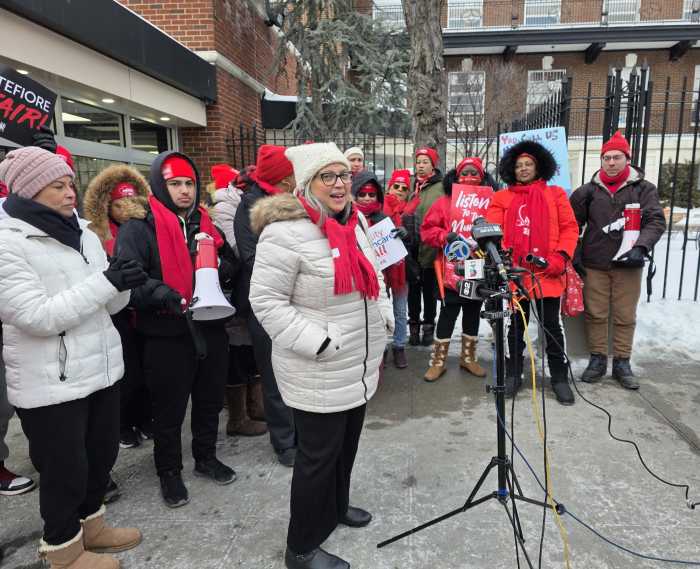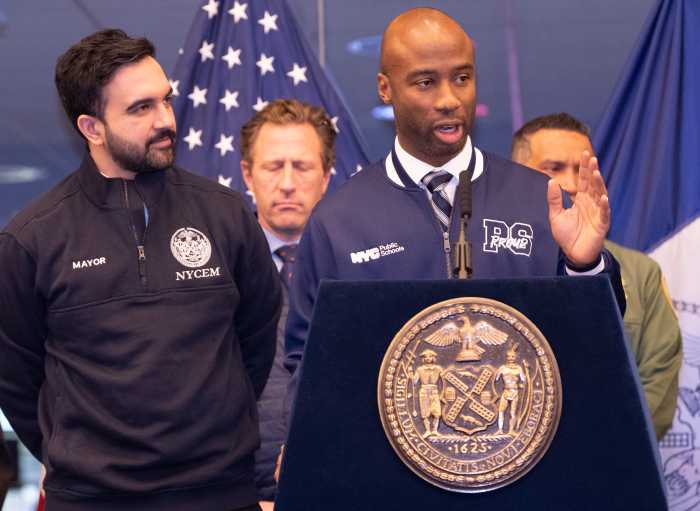With nearly five months before voters go to the polls, Pres. George W. Bush announced during a prime time speech on Monday evening that he has a five-part plan that he will explain in five different speeches in the five weeks remaining before the June 30 transfer of sovereignty to an Iraqi government.
In his first of these speeches, the President invoked patriotic images to obscure the facts rather than enlighten his fellow Americans about the truth of the war in Iraq. Bush referred to Iraq as “hard-won ground” when in fact the initial military campaign was easily won. Iraqi citizens offered no resistance and stepped aside while Saddam Hussein fell.
However, during the ensuing American occupation, U.S. troops started dying in increasingly large numbers. Iraq had been favorably disposed to the United States, but then average Iraqis began turning against their liberator. Bush still believes that there is time to restore Iraqi and world faith in the United States. Once more, Bush has said he wants Iraqis to govern Iraqis.
According to Bush, the June 30 transfer of sovereignty will persuade Iraqis that the United States has “no interest in occupation.” The president believes that Iraqis will understand that the Iraqi government is their government and will support it and turn against those who oppose a U.S. presence. Although this new “interim government” will be unelected, Bush believes the transfer of power will be momentous.
“The occupation will end, and Iraqis will govern their own affairs,” Bush asserted.
To demonstrate just how dramatic the change will be, the commander in chief will be making a speech every week until the transfer. He hopes to persuade Americans he is doing an excellent job. He probably also hopes that John Kerry will come out of the woodwork and take a strong stand against his Iraq policy. Kerry may choose instead to stay on the sidelines while Bush’ s job approval rating continues to sink like a stone.
Bush’s advisers must hate the way the turmoil of the war has fallen exclusively on the president’s shoulders. Surely, his war council would prefer Kerry to offer comments that cause division between the hawks and the doves in the Democratic Party. So far, Kerry’s cautious low profile has kept most Democrats loyal to the party while the Massachusetts senator began a very public effort to enlist Ralph Nader’s support.
The president faces a monumental test of his credibility in persuading reasonable people that a true transfer of Iraqi sovereignty will occur on June 30. Regardless of who is the Iraqi ruler, U.S. combat troops will stay, Bush said.
“Given the recent increase in violence, we’ll maintain our troop level at the current 138,000 as long as necessary,” he pledged.
If necessary, Bush said, he will deploy more troops.
The contradiction is glaring. Thousands of foreign soldiers roaming freely, a sovereign nation does not make.
In fact, the Iraqis will only have limited control over their domestic affairs. The president promised that the billions of dollars in funds appropriated by Congress for Iraqi reconstruction will be spent, but “to ensure our money is spent wisely and effectively, our new embassy in Iraq will have regional offices in several key cities. These offices will work closely with Iraqis at all levels of government to help make sure projects are completed on time and on budget.”
Bush stayed silent on the question of who will control Iraq’s oil revenues.
Currently, the Development Fund for Iraq holds these assets. Interestingly, the draft resolution submitted by the United States and Great Britain to the Security Council provides that these funds will be turned over to Iraq’s interim government, ostensibly on June 30.
Fred Kaplan, an online contributor to Slate magazine, says this proposal is either a genuine indication of validating Iraq’s sovereignty or a Bush sleight of hand. An international advisory group is slated to monitor these oil revenues. If the group merely provides oversight while Iraqis decide how to allocate the funds, then Bush will have confounded his critics. This United Nations debate has great importance, not only for the future of Iraq but also for the international perception of the United States. It is an issue that could figure prominently in the presidential race.
In his speeches, Bush presents a simplified reality about Iraq, when in fact the policy of the United States is complicated, constantly changing, and not fully consistent. Only rarely can these changes be tracked in the president’s public statements. In offering a superficial public presentation in his latest speech, Bush continues to conceal a nearly hidden strategic plan.
What happens if the new Iraqi government asks the United States to leave after June 30?
Walter Russell Mead of the Council on Foreign Relations speculates the United States might just welcome such a request and come home.
Incredibly, that may be what Bush wants.
A dovish incumbent Bush would complicate, and even has the chance of dooming, Kerry’s presidential bid. It is characteristic of this administration that we have no way of knowing precisely what is going on.


































